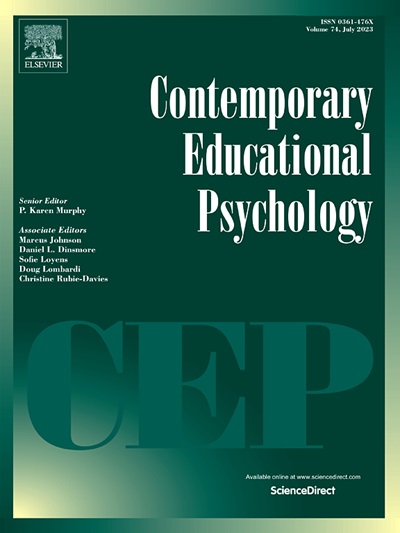我该留下还是走?儿童反馈动机及其与数学焦虑和数学自我概念的关系
IF 3.8
1区 心理学
Q1 PSYCHOLOGY, EDUCATIONAL
引用次数: 0
摘要
接受纠正性反馈可以以不同的方式影响动机——要么激励学习者继续学习,要么引导学习者逃避任务。在本研究中,我们考察了小学生对反馈的即时行为动机及其与数学焦虑和自我概念的关系。儿童(N = 150;M年龄= 7.35;女性占44%;(65%是白人)在电脑游戏中解决了一系列数学等价问题(例如,3 + 4 = 5 +?)他们会收到一次又一次的反馈,其中包括对结果的了解(KR)和对正确反应的了解(KCR),他们可以选择在每个关卡结束后停止游戏或继续游戏。孩子们通常都很有动力,并选择完成许多项目。然而,收到很多负面反馈的孩子比其他人更早地停止了游戏,尤其是当他们也有高度的数学焦虑或高度的数学自我概念时。与我们的预测相反,更高的数学自我概念与更高的继续玩下去的动机并没有很强的联系。这些结果对反馈理论和设计能够支持儿童动机的问题解决环境具有启示意义。本文章由计算机程序翻译,如有差异,请以英文原文为准。
Should I stay or should I go? Children’s motivation in response to feedback and its association with math anxiety and math self-concept
Receiving corrective feedback can influence motivation in different ways – either inspiring learners to continue or leading learners to avoid the task. In the current study, we examined elementary school children’s in-the-moment behavioral motivation in response to feedback, and how it related to their anxiety and self-concept in mathematics. Children (N = 150; M age = 7.35; 44 % female; 65 % White) in the United States solved a series of mathematical equivalence problems in the context of a computer game (e.g., 3 + 4 = 5 +?). They received trial-by-trial feedback that included both knowledge of results (KR) and knowledge of the correct response (KCR), and they had the option to stop the game or keep playing after each level. Children were generally motivated and chose to complete many items. However, children who received a lot of negative feedback stopped the game earlier relative to others, and this was especially true when they also had high math anxiety or high math self-concept. In contrast to our predictions, higher math self-concept was not strongly associated with higher motivation to keep playing. These results have implications for theories on feedback and for designing problem-solving contexts that can support children’s motivation.
求助全文
通过发布文献求助,成功后即可免费获取论文全文。
去求助
来源期刊

Contemporary Educational Psychology
PSYCHOLOGY, EDUCATIONAL-
CiteScore
16.50
自引率
3.90%
发文量
74
期刊介绍:
Contemporary Educational Psychology is a scholarly journal that publishes empirical research from various parts of the world. The research aims to substantially advance, extend, or re-envision the ongoing discourse in educational psychology research and practice. To be considered for publication, manuscripts must be well-grounded in a comprehensive theoretical and empirical framework. This framework should raise critical and timely questions that educational psychology currently faces. Additionally, the questions asked should be closely related to the chosen methodological approach, and the authors should provide actionable implications for education research and practice. The journal seeks to publish manuscripts that offer cutting-edge theoretical and methodological perspectives on critical and timely education questions.
The journal is abstracted and indexed in various databases, including Contents Pages in Education, Australian Educational Index, Current Contents, EBSCOhost, Education Index, ERA, PsycINFO, Sociology of Education Abstracts, PubMed/Medline, BIOSIS Previews, and others.
 求助内容:
求助内容: 应助结果提醒方式:
应助结果提醒方式:


